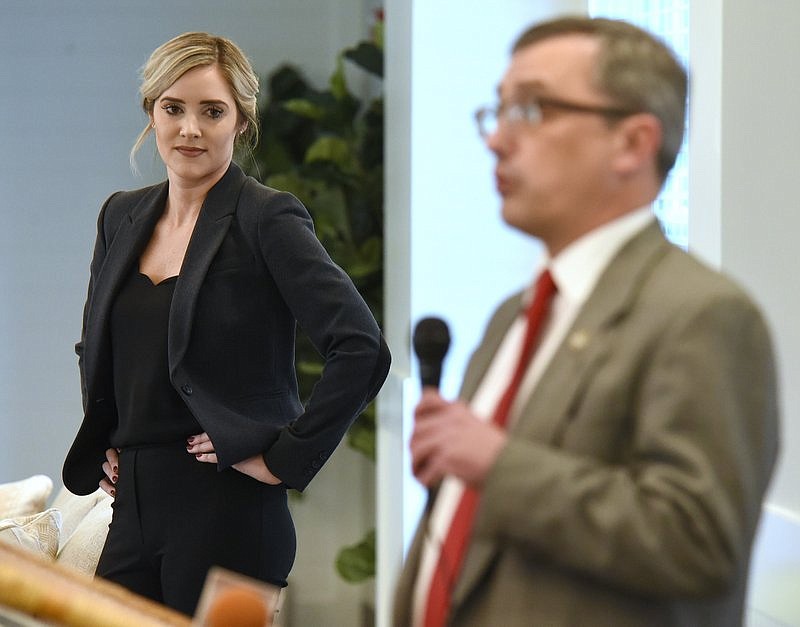If three candidates for district attorney general of Hamilton County stood on a stage even five years ago and said that marijuana prosecutions were a nuisance, the audience might have shared a collective gasp.
The audience at a judicial forum in the University of Tennessee at Chattanooga student center Monday night hardly lifted an eyebrow.
"I'm not sure we can ethically prosecute marijuana," Attorney General Neal Pinkston told the Times Free Press editorial board last week. "We're dismissing a lot of those [charges for misdemeanor possession]."
The problem, he explained, is the proliferation of hemp products legally available on the market. It's difficult for blood tests to distinguish between marijuana and hemp in the body, he said.
"Marijuana is still illegal, yes," Pinkston, a Republican, said, "... but how do you prosecute it?"
On Monday at UTC, he intimated his office had been ahead of the game in dismissals.
"We've not really been prosecuting that for the last couple of years due to issues of trying to determine what's marijuana and what's hemp," Pinkston said. "So we've already established a track record of that."
Democratic challenger John Allen Brooks told the Times Free Press editorial board recently that marijuana should legal. Period.
"I'm not going to waste much time" on misdemeanor prosecutions for possession if he were elected, he told editors.
Brooks repeated his thoughts to the UTC audience.
"It's time we legalize marijuana," he said. "It's foolish to go ahead and put people in jail for that."
Coty Wamp, Pinkston's Republican primary challenger who has excoriated the attorney general in debates for lack of prosecuting certain crimes, more or less agreed.
"This has got to be a fluid conversation we're having," she told the UTC audience, "because as our legislature keeps reviewing our marijuana bills over and over and over again, sometime down the road, in like 3031 when it's legalized, whenever that may be, we're going to have to keep having this conversation about how we treat marijuana. I will say this, I think we've all agreed on this stage we've got to stop worrying about marijuana in Hamilton County. We've got too many issues that we need to be looking at... We've got to stop caring as much about marijuana across the board."
However, Wamp said the fact marijuana is illegal in Tennessee makes it tough for both a prosecutor and a user.
"It's a hard position for somebody who's a prosecutor to be in ... but we've got to make sure that young people know that you're going to still be held accountable for marijuana," she said. "As silly as it is, we have to make sure we understand that. So it would not be prudent to just say 'use marijuana but don't use anything else,' because that's not where we're at in this state still ... It's a thin line [that] we've got to figure out how to walk in the next decade."
The United States House wants to schedule that walk a lot sooner. Recently, it passed the MORE Act. That stands for the Marijuana Opportunity Reinvestment and Expungement Act, which would federally legalize marijuana. The House previously passed the MORE Act in December 2020. But prospects in the Senate then, and now, are not bright.
Marijuana today is fully legal in 19 states and only fully illegal in four states. The rest are mixed among states where only medical marijuana is legal; where medical marijuana is legal and recreational marijuana is decriminalized; where recreational marijuana is decriminalized; and where only CBD (cannabidiol, a chemical found in marijuana and used to treat various conditions) is legal.
A bill search of the word "marijuana" on the Tennessee General Assembly website offers 27 hits, if you'll pardon the pun, during the 2021-2022 session. Most of them were in 2021.
Of the eight bills (four in the Senate and four in the House) introduced this year, only two appear to remain, the Senate and House version of bills establishing a medical marijuana program. The Senate version was to be discussed in the Judiciary Committee last week, and the House version had been referred to the Criminal Justice Committee.
We're sure the country needs a little more study on the federal legalization of marijuana, but we're also sure the Tennessee legislature has dragged its feet too long on medical marijuana, which has the potential to help so many people.
In between the two is state legalization of recreational use. We don't see that happening in Tennessee in the near future, but it probably will happen eventually because of the argument about its confusion with hemp, because of its taxing potential and because it will be legal most everywhere else. In the meantime, our best minds should be studying what's in today's marijuana, how (or if) the argument remains about whether it leads to further drug use and how it would be regulated.
It's not the route we'd suggest, but otherwise, as the DA candidate Wamp pointed out, "we're going to have to keep having this conversation."
